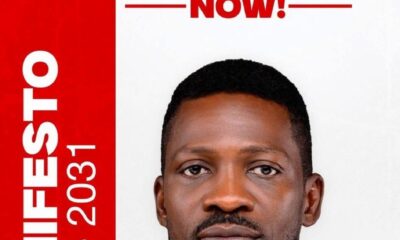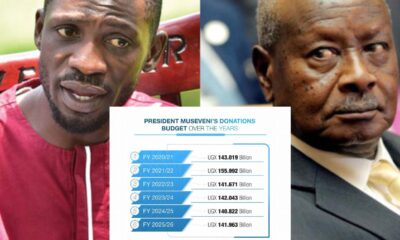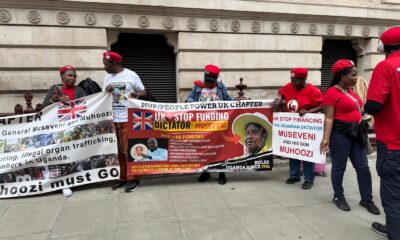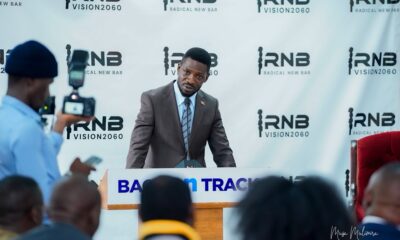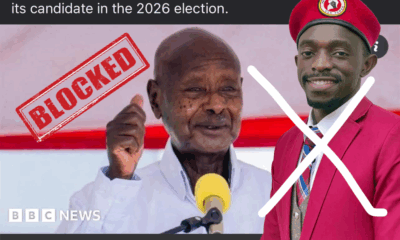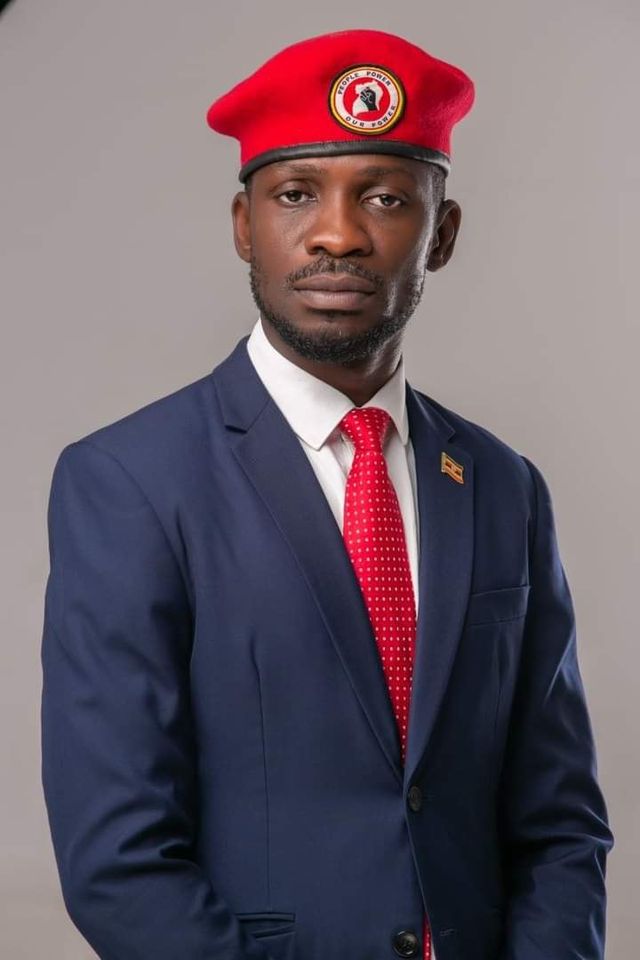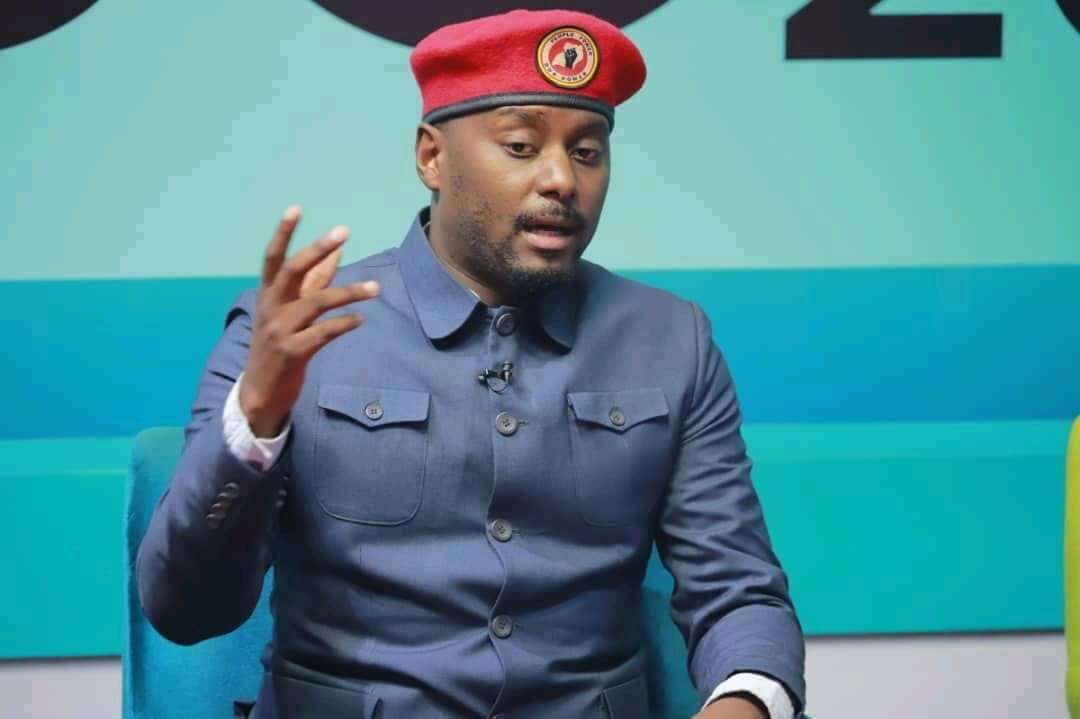

Uganda
This is why dictator M7 throws “Small victories” to the opposition
Understanding the “Small Victories” in a Dictatorship – David Lewis Rubongoya
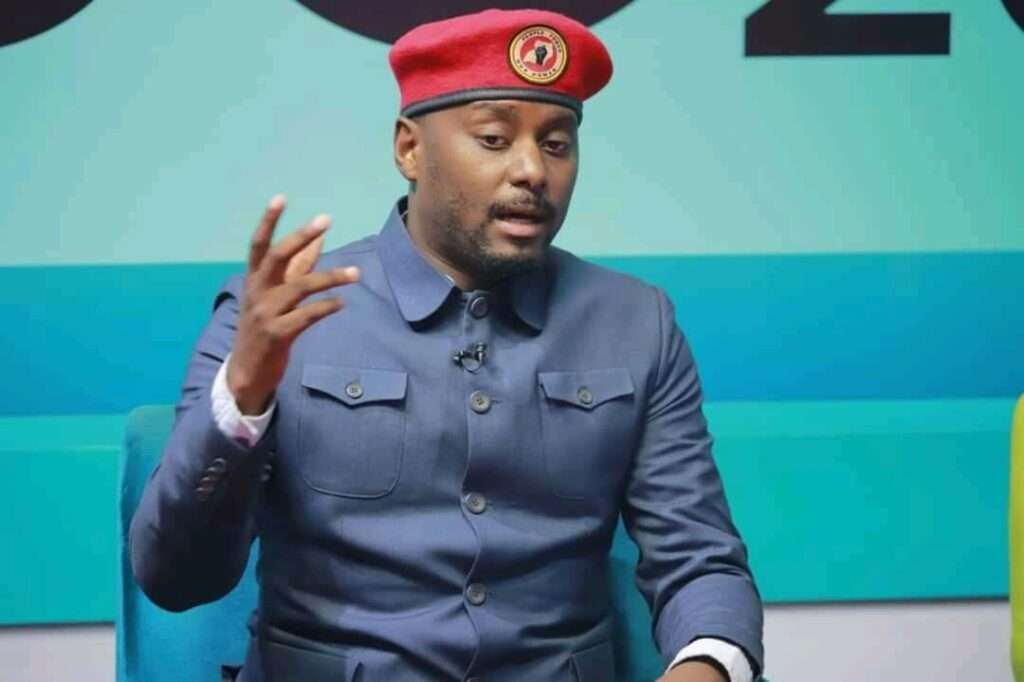
In the past, Uganda has been described by scholars and researchers as a “hybrid regime”. Hybrid regimes are those which are dictatorial at the core, but for convenience, they also put in place a semblance of democratic features. nnTherefore, a hybrid regime will hold regular elections every five years, but those elections are not free and fair. They will ensure that power does not change through those elections. At MP and local government levels, they may allow the opposition to get some seats, but substantially they ensure that real power remains in the hands of the autocratic regime. nnLikewise, although the judiciary is under capture, every once in a while, the opposition may get some court victories on matters not so great in significance to the regime. But on matters with potential to upset the status quo, such as Presidential Election Petitions, the Age Limit case, etc courts will not move an inch. Even if you have the most straight forward case, they would rather rely on some technicality to rule in favor of the regime. nnIn the same way, Parliament which is under the dictates of the autocrat, may sometimes pass resolutions that appear to be pro-people, but this can only be possible on matters that have no potential to answer the democratic question. When it comes to questions of term limits, substantive electoral reforms, etc, Members of Parliament are either persuaded through manipulation, or coerced and reminded how they must vote. If there is potential for rebellion in the August House, military choppers will hover over the Parliament building! nnThis goes for all other agencies including the Electoral Commission, security agencies, UCC, etc.nnThe regime will determine elections where they do not have much interest or where massive rigging may lead to worse problems for them. In those cases, you may have an opposition leader declared winner. nnIn a hybrid regime, the media may be allowed to operate and even criticise the autocrat. But the plug will be pulled when what is aired on the media gains traction and has real potential to rally the masses into action. Then the media houses will be closed, licenses revoked, etc. The fate of CBS in 2009 comes to mind.nnIn a hybrid regime, you may have institutions mandated to fight corruption. But those institutions are only capable of holding to account “small fish”. The real corrupt people in powerful places will always be shielded. nnYou may have a Human Rights Commission in place. They can entertain human rights complaints and even release reports critical to the state. But you will not see them call for the prosecution of the Generals who ordered for the execution of citizens in broad daylight. Cases of missing persons- if political in nature, will always be given a blind eye. Why? Because the institution heads know who appoints them and butters their bread. nnBut to an outside observer and even an insider who is not very critical, the presence of these institutions will be hailed as symbols of democratic rule. nnOne may ask, why do these regimes do this? They are super pretenders. They pretend to be democratic in nature for several reasons. nn1. To keep the international community persuaded to deal with them or simply not to throw them out. Outright dictatorship (rule by decree) has fallen out of favor internationally since the 1980s. At present, there are a few regimes which can manage to be outrightly autocratic and get away with it. nnSo most dictatorial regimes will pretend to exercise some democratic tendencies simply to hoodwink or manipulate the international community and keep them convinced that there is room for improvement. You will often hear a diplomat say, “Yes, things are bad, but they could be worse”. And so the regime is able to live to another day. nn2. To keep the population in check. Regimes of this nature know the inherent capacity of the people to rise up when they are pushed to the wall. So they will often throw some small victories to oppressed people, in order to keep them optimistic and not offended all the time. They may carry out nine oppressive moves and then notice the brewing anger. A “small victory” at that point may pacify the situation. However, if the oppressed people decide to, nonetheless go on to express their anger, then the regime puts every pretense aside and shows itself for the military dictatorship it is. nn3. Propaganda value. The few victories handed to the opposition in a dictatorship are often used by regime apologists to discredit the argument that things don’t work in the country. So if Parliament strikes down the Vinci Coffee Agreement or a court orders for the release of an opposition activist, you will often hear regime apologists say, “The opposition claims that courts don’t work, only when decisions are not in their favor.” When you criticise the lack of independence by the electoral body, they remind you how the same body declared some of your MPs winners. This is always well planned and choreographed in order to discredit a right argument. nnHere is another example. At the height of protests and political activities, political leaders will be trailed, beaten, arrested, harassed and kept under house arrest. But when there are no activities and in their assessment the risk is low, they will allow political leaders to move around freely but under watch. And their propagandists will be saying, “How can you be free to move around if we are in a dictatorship?” This is all manipulation. nnThere are other reasons for the pretense, including using small victories as baits for compromise and manipulation of desperate leaders within the opposition. nnBecause hybrid regimes are dictatorships in pretence, their true colors will always come out when they are under real threat. Survival is their main business and they don’t compromise on that. That is why we saw what we saw during the Age Limit debate. It wasn’t any debate. It was about the survival of the regime, and so they had to bring out all manner of violence and force. nnLikewise, during the 2020/21 campaigns when it became clear to the regime that there was no chance of even getting 30% of the vote, they resorted to the kind of brute force not experienced before in this land. Broad daylight executions, abductions, torture, illegal detentions, etc. What we saw between 18th and 19th November 2020 was the real military regime come out of its shell because they felt that their survival was on the line. nnI have written this down to simply supplement on the call for us no to be overly excited by some small victories we get a long the way, and forget the bigger picture. It is important that citizens understand how manipulative hybrid regimes are. That is the only way we shall be able to look beyond the small crumbs that fall off their table and pursue the right to sit at the table and charter the course for our country.nnThere is hope. At the fall of Omar al Bashir, I read an article titled – “Sudan’s Master-Manipulator Falls”. They fall.
Africa
Bobiwine in year 3020 a defining topic in African books of history
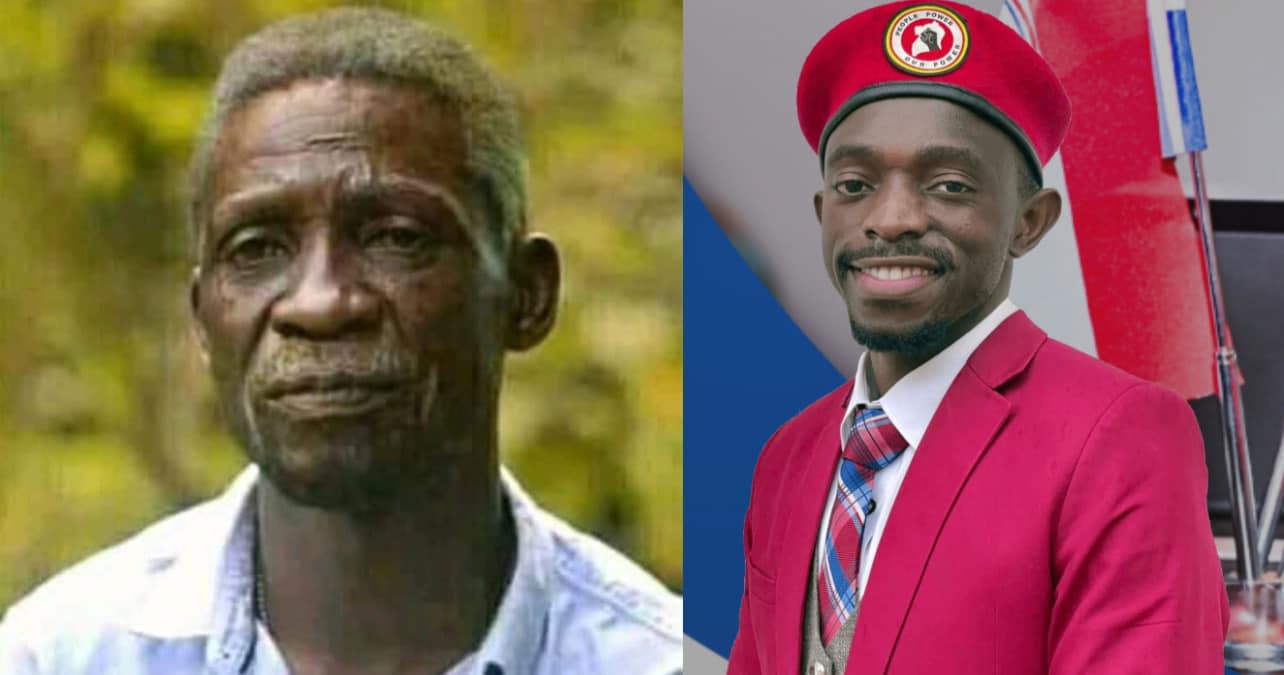
Reminder;
Believe it or not, by year 3020, “BOBI WINE AND PEOPLE POWER” will be a defining topic in African books of history.
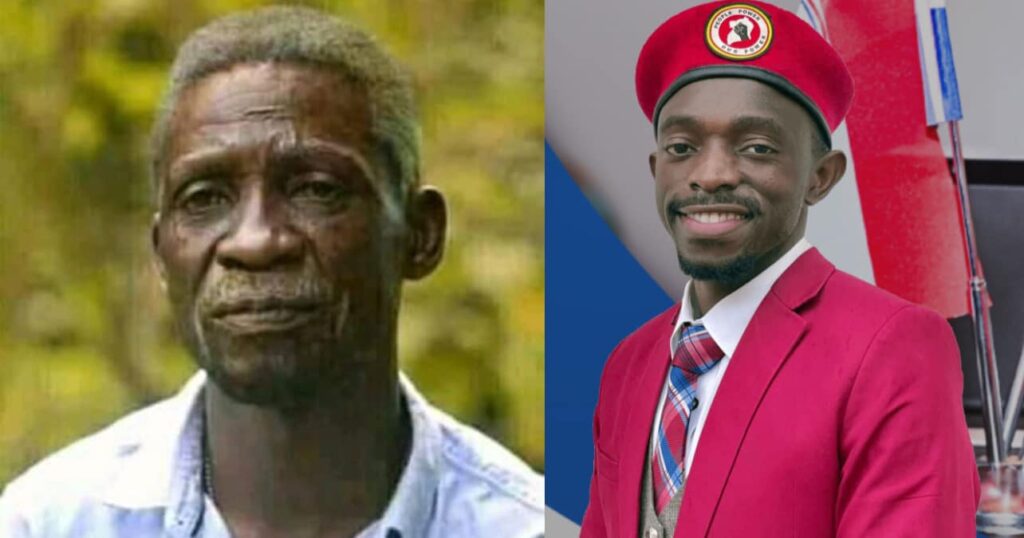
Our sons and daughters will have the privilege of reading about this brilliant, fearless, and patriotic young leader who flipped the script, sacrificed his celebrity lifestyle and took it upon himself to free Uganda from a long Serving dictator, M7 who had misruled Uganda for 40 years.
It will be both an inspiring and heartbreaking sad tale for our grand sons and daughters as they will be subjected to scripts that will feature the high Corruption rate , the Impunity, Unemployment,
nepotism, Military rule, land grabbing, endless Murders of innocent Ugandans, and so much more that existed before Bobi Wine’s leadership.
But as they read between the lines, they will shed tears of joy knowing that Robert Kyagulanyi Ssentamu, aka Bobi Wine, and the entire People Power movement eventually triumphed, transformed Uganda, set strong democratic precedents, and paved the way that leaders after them followed to steer the nation in the right direction, the nation our grand sons and daughters will be enjoying by that time.
By then, the People Power revolution will have swept and dismantled dictatorships across Africa, as African nations that were subjects of dictatorship gained confidence after seeing it done in Uganda. By this time, Uganda is now a developed country, the pearl of Africa again – in its true meaning, in all aspects of life social economic and political, Everything went back to normal, you cant believe we have ever had a dictator called Museveni. The days of dictatorship will feel like a distant, unimaginable past.
Statues of Bobi Wine, clad in full People Power combat gear and the iconic beret, stand tall in major cities. People come take photos, shoot films, and document history—without fear of teargas or repression. A free and democratic Uganda finally a reality.
Bwetukomawo, today is February 3, 2025.
The weight of this change rests on our shoulders, and the truth is no one is going to do it for us. If we want a free Uganda, we must rise as a generation, stand together, and take action.
This fight demands more than just hope, it requires courage, trust, discipline, and an unshakable resolve. The forces of oppression will test us as they have done countless tyms but we must stand firm, knowing that every sacrifice, every effort, brings us closer to victory.
And make no mistake, at the end of it all, we shall win. Uganda will be free, and history will remember this generation as the one that refused to kneel before tyranny.
The time is now. The struggle continues. Together, we shall overcome.
I remain,#JBMuwonge #PeoplePowerOurPower

Exclusive
Justin: Rt. Hon. Mathias Mpuuga asked to Resign After Admitting Taking Irregular Service Award 500 Million
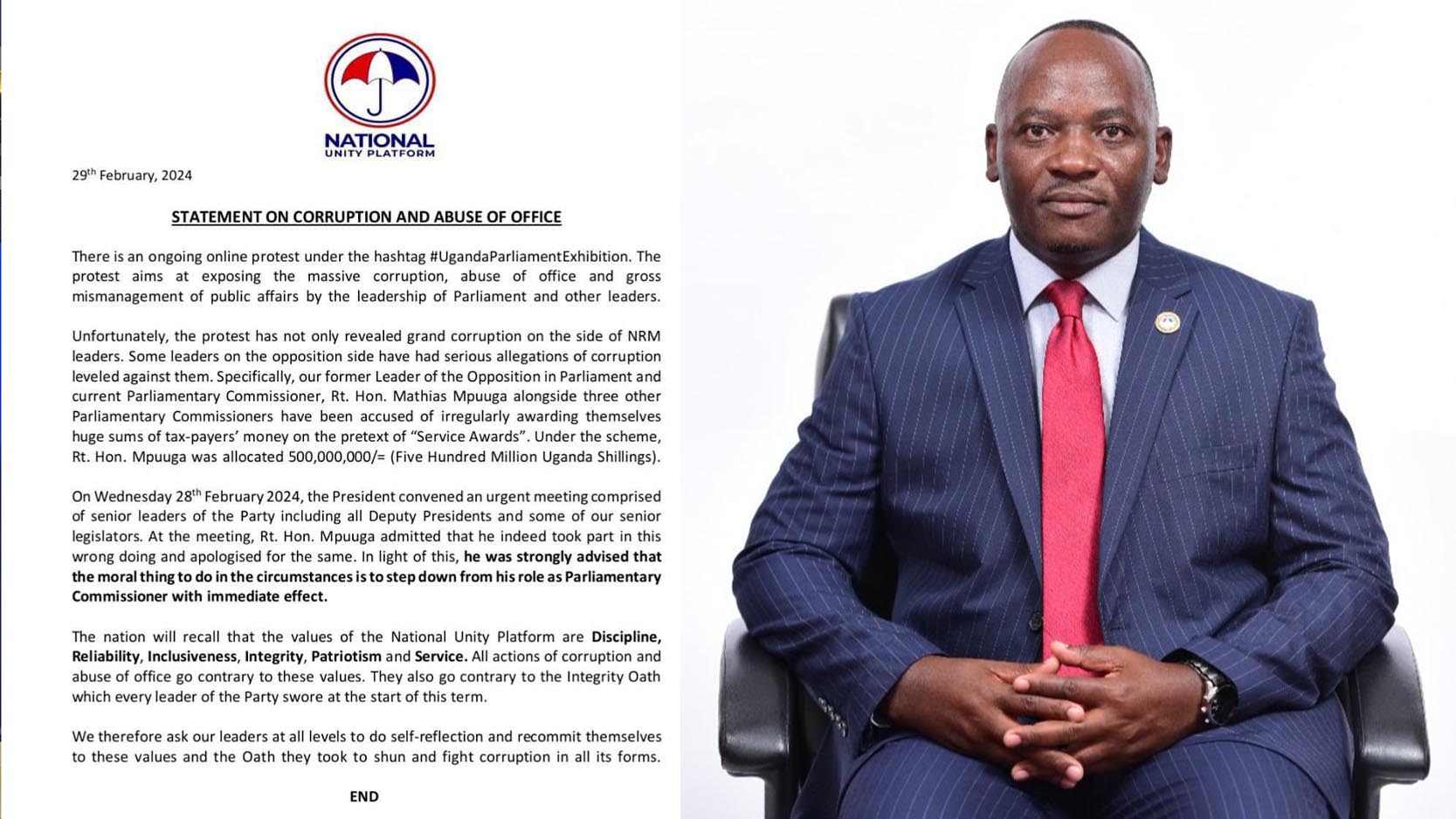
Former Leader of Opposition in Parliament Mathias Mpuuga asked to Resign by the NUP party to resign from the position of Commissioner of Parliament after admitting to having taken part in an irregular service award amounting to UGX 500 million.
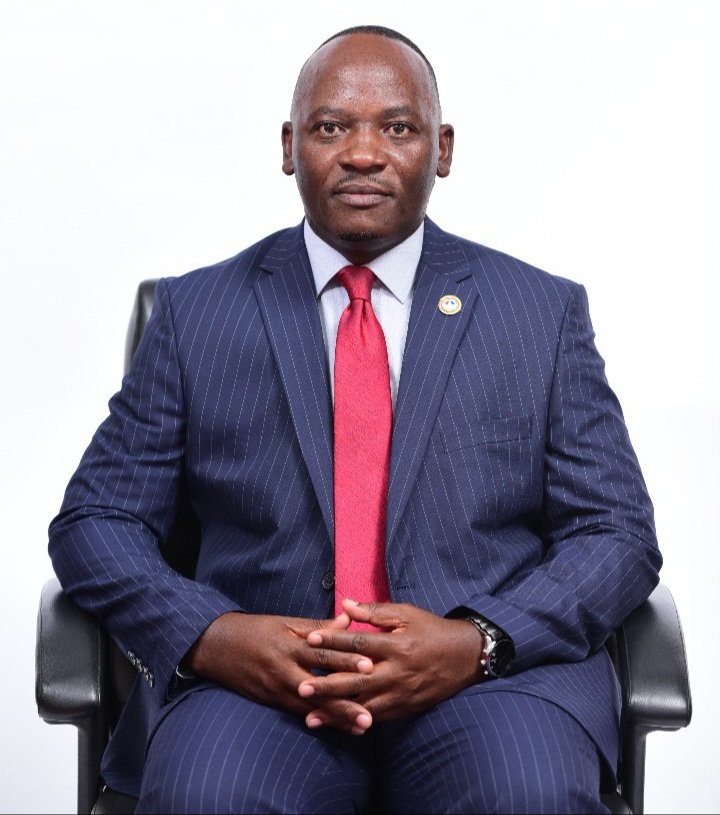
There is an ongoing online protest under the hashtag #UgandaParliamentExhibition. The protest aims at exposing the massive corruption, abuse of office and gross mismanagement of public affairs by the leadership of Parliament and other leaders.
Unfortunately, the protest has not only revealed grand corruption on the side of NRM leaders. Some leaders on the opposition side have had serious allegations of corruption leveled against them. Specifically, our former Leader of the Opposition in Parliament and current Parliamentary Commissioner, Rt. Hon. Mathias Mpuuga alongside three other Parliamentary Commissioners have been accused of irregularly awarding themselves huge sums of tax-payers’ money on the pretext of “Service Awards”. Under the scheme, Rt. Hon. Mpuuga was allocated 500,000,000/= (Five Hundred Million Uganda Shillings).
On Wednesday 28th February 2024, the President convened an urgent meeting comprised of senior leaders of the Party including all Deputy Presidents and some of our senior legislators. At the meeting, Rt. Hon. Mpuuga admitted that he indeed took part in this wrong doing and apologised for the same. In light of this, he was strongly advised that the moral thing to do in the circumstances is to step down from his role as Parliamentary Commissioner with immediate effect.
The nation will recall that the values of the National Unity Platform are Discipline, Reliability, Inclusiveness, Integrity, Patriotism and Service. All actions of corruption and abuse of office go contrary to these values. They also go contrary to the Integrity Oath which every leader of the Party swore at the start of this term.
We therefore ask our leaders at all levels to do self-reflection and recommit themselves to these values and the Oath they took to shun and fight corruption in all its forms.
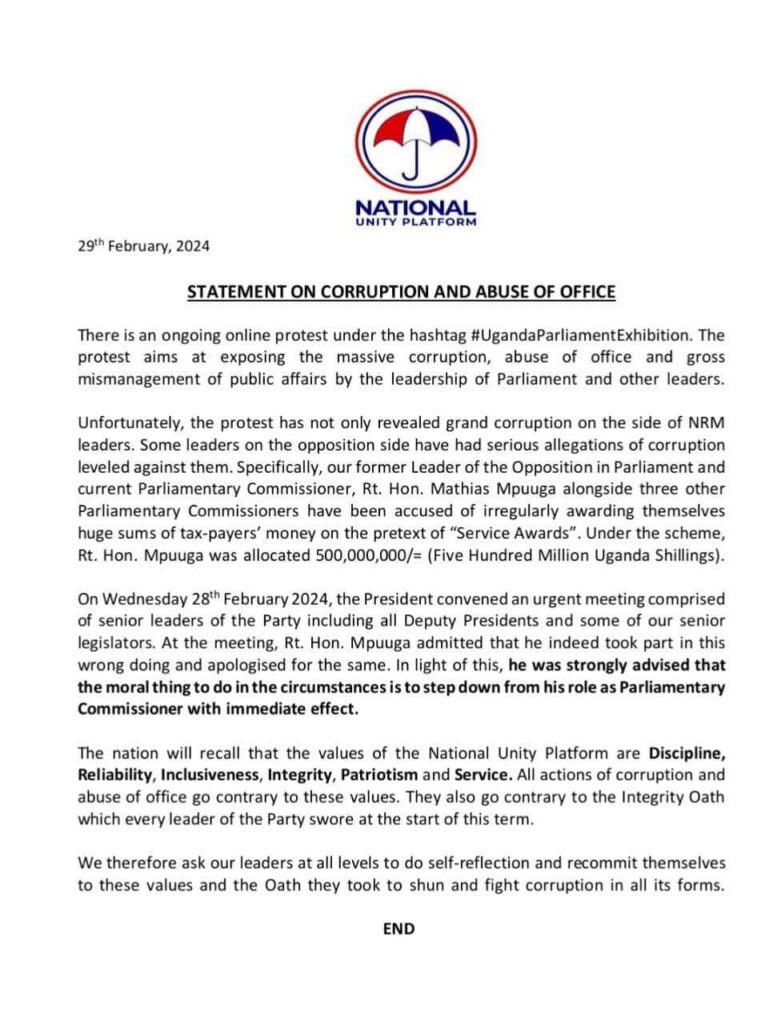
Politics
Repressive Tactics used by Dictator Museveni to silence dissent and what activists have resorted to in Uganda.
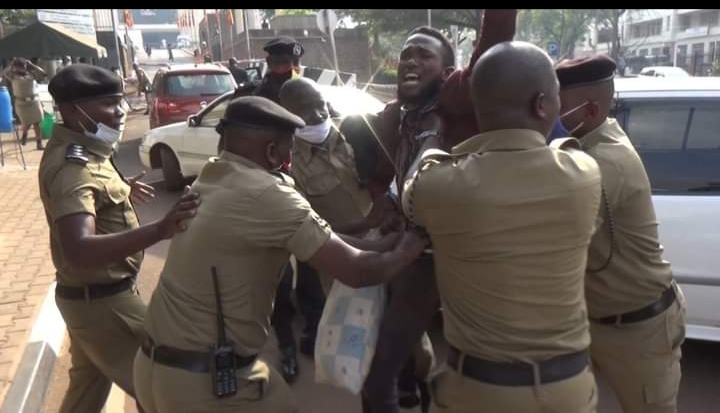
What you need to know
“Activists in Uganda are increasingly recognizing the importance of exposing these enablers. By shining a light on the individuals who facilitate and execute Museveni’s oppressive tactics, activists aim to dismantle the system of impunity that allows such abuses to continue. This approach not only seeks to hold accountable those directly responsible for human rights violations but also challenges the broader power structures that sustain dictatorial rule.”
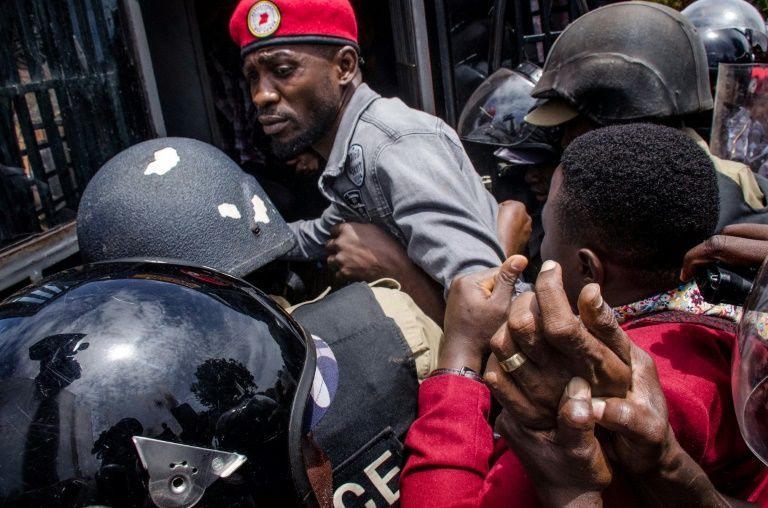
Yoweri Museveni’s authoritarian regime in Uganda has continued to systematically dismantle any form of dissent or opposition for over three decades. Museveni employs a range of repressive tactics designed to intimidate, silence and eliminate those who dare to criticize or oppose him.
Abductions carried out by security forces are commonplace, with critics of the regime seized from their homes or the streets, blindfolded and taken to undisclosed locations. In these ungazetted detention centers referred to as “safe houses”, detainees are subjected to torture and denied due process or access to lawyers and families. Some eventually resurface, dumped in remote areas, while many simply disappear without a trace an example is John Bosco Kibalama who was abducted on the 3rd of June 2019 and many others.
The use of unlawful detention is another key weapon for Museveni, who regularly has opposition leaders and activists unlawfully arrested and imprisoned for prolonged periods without trial. By locking up opponents indefinitely, the regime aims to weaken and fracture any organized resistance. Prominent opposition figures and academicians have found themselves thrown in jail on questionable charges.
Beyond detention, Museveni also ruthlessly clamps down on dissent through targeted killings and assassinations. Security operatives have shot opposition leaning prominent Ugandans in broad daylight and run vehicles of activists off the road. Homes of anti-regime lawyers and journalists have been raided by armed assailants resulting in point-blank murders. These violent silencing tactics instill deep fear across Ugandan society.
To try to evade accountability, Museveni relies on a network of enablers spread across the judiciary, security establishment, public sector and beyond. Complicit judges, officials, police chiefs and magistrates all play a role enacting the regime’s oppressive agenda through sham trials, trumped up charges, abductions, illegal detentions and more.
Police and soldiers carry out violent crackdowns on protests. Prison authorities hold detainees incommunicado and deny them due process. Together, these individuals form a machinery of oppression that ruthlessly crushes any challenge to Museveni’s authority.
Despite the grave risks, courageous activists continue exposing human rights abuses, building solidarity networks and using both legal means and civil disobedience to challenge the regime’s grip on power.
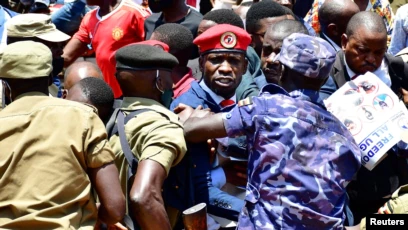
Human rights defenders and concerned civilians are documenting stories of torture and enforced disappearance, turning victims into symbols of resistance. Opposition leaders are calling for sanctions and travel bans against specific security officials complicit in abuses but most importantly against the man at the helm of all this, Museveni.
By targeting not just Museveni but also his lieutenants, activists are striking at the foundation of the regime’s repressive edifice. Their brave actions are leading to greater global solidarity, as international civil society groups amplify calls for accountability and governments face pressure to act against Museveni’s key henchmen.
With their focus on dismantling the structures and individuals propping up dictatorship, Ugandan activists offer hope for a future where impunity is replaced by justice. Our struggle is about more than just Museveni’s exit – it aims to build a Uganda where the human rights and civil liberties of all citizens are respected. Although the road ahead remains fraught with risks, these courageous voices show that even the most entrenched authoritarian systems are vulnerable when their victims unite to expose their abusers.
We there for call upon the entire human race globally to pay attention to what is happening in Uganda under Yoweri Museveni who captured power in 1986 through armed struggle and has clung onto power till to date by using the military to crush any opposition.
Museveni has gradually eroded democratic norms, removed term limits and age limits, and stifled any dissent in order to entrench his authoritarian rule. Ugandans have continued to pay a steep price as Museveni’s security apparatus abducts, tortures, detains and assassinates opposition voices with impunity.
The stories of victims like John Bosco Kibalama and many other disappeared Ugandans need to be heard. The voices of activists, opposition leaders, journalists and citizens being crushed by Museveni’s brutal machinery of oppression need to be amplified on the global stage.
Most of these Museveni repressive tactics were Cleary captured live on camera and documented well in the Bobi Wine the People’s president Documentary, a gripping documentary that chronicles the remarkable journey of Bobi Wine, a pop star-turned-politician, as he strives to dismantle Uganda’s brutal dictatorship under Museveni brutal rule. The film delves into the 2021 Ugandan presidential election, where Bobi Wine, alongside his wife Barbie, leads a courageous fight for freedom against President Museveni’s oppressive 35-year regime
It is high time the international community re-examined its ties with Museveni’s regime and took concrete action to stand with Ugandans yearning to be free of decades of dictatorship. With rising resistance and striving for change, Uganda needs solidarity from world leaders, civil society and human rights defenders in this difficult struggle.
Writer
Social Activit JBMuwonge
Email: contact.jbmuwonge.com
-
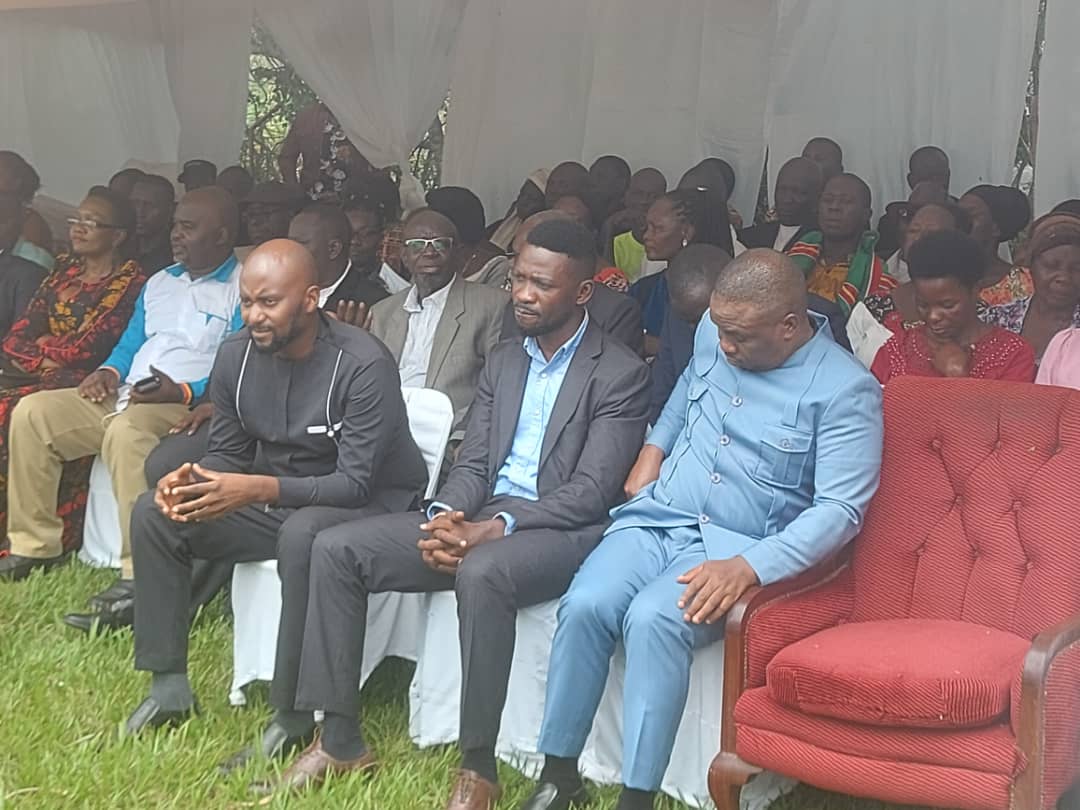
 News3 years ago
News3 years agoPresident Bobi attends burial of wife to ex LOP Oguttu
-
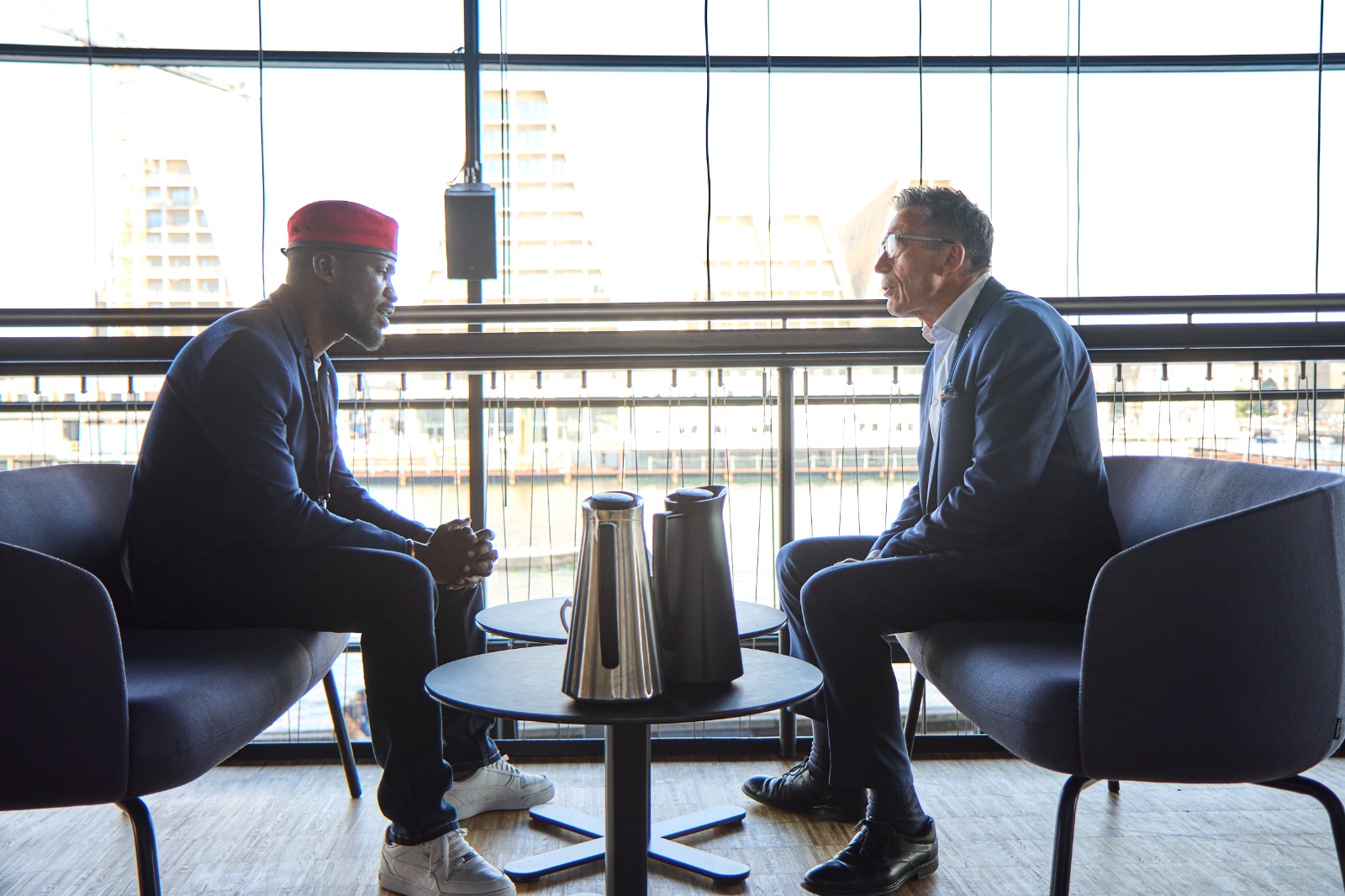
 News3 years ago
News3 years agoBobi meets ex NATO boss, discuss key issues
-
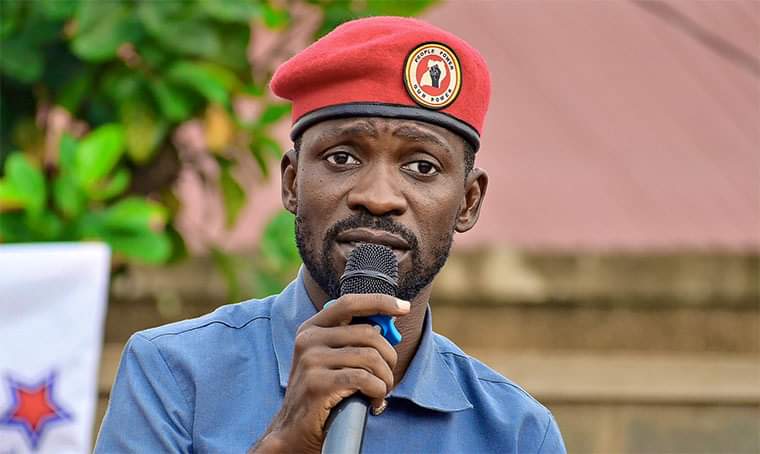
 News3 years ago
News3 years agoEXCLUSIVE: A recap of Bobi Wine interview with BBS
-
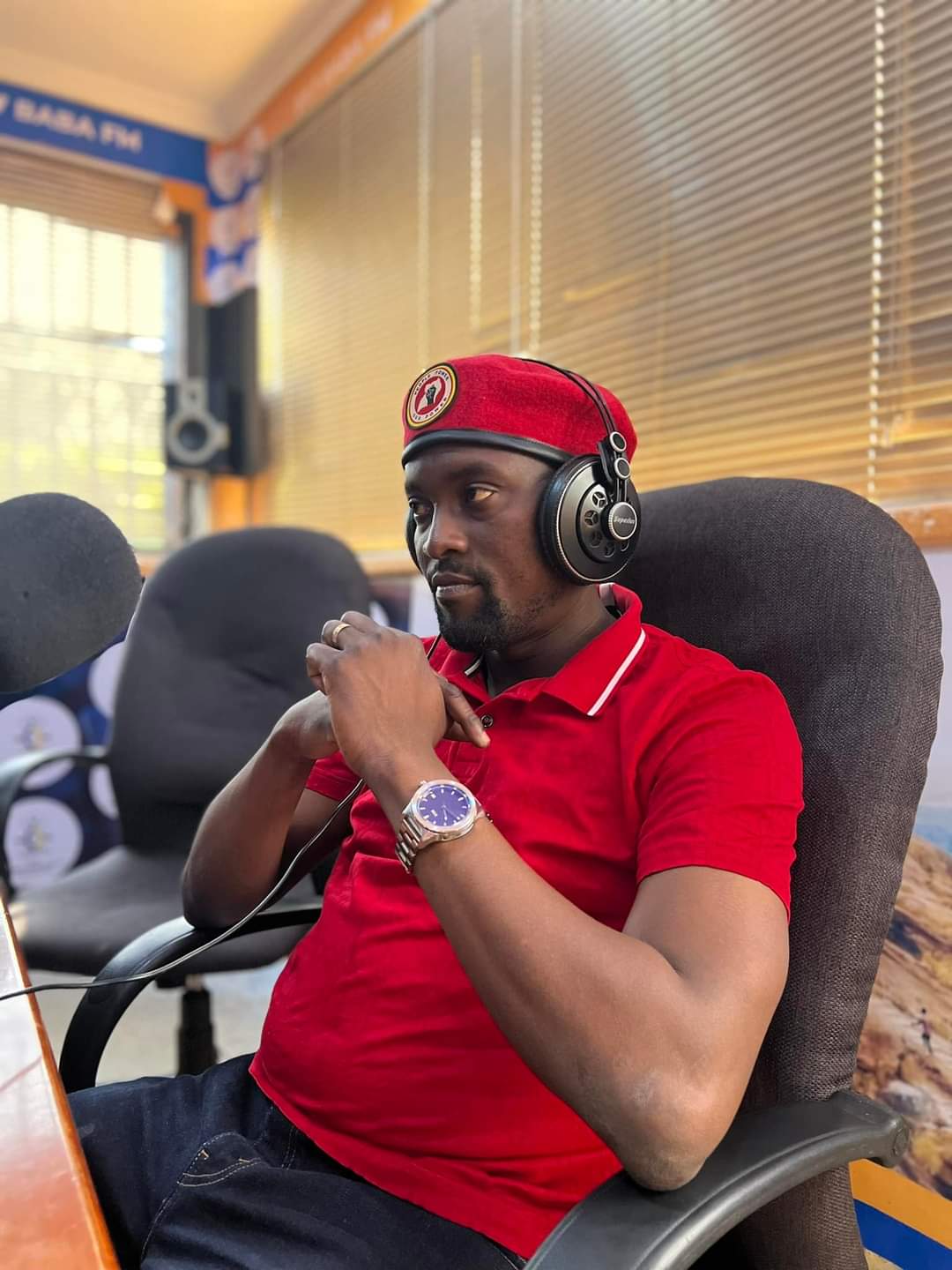
 Exclusive3 years ago
Exclusive3 years agoNUP Deputy Spokesperson Waiswa celebrates birthday in style
-
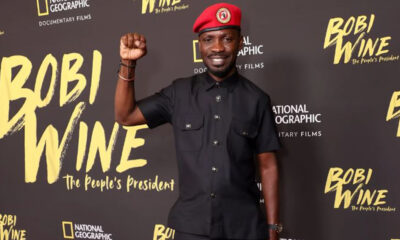
 Exclusive2 years ago
Exclusive2 years agoBobi Wine The People’s President Full Documentary
-
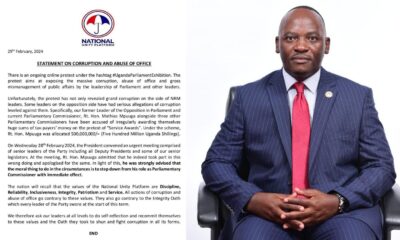
 Exclusive2 years ago
Exclusive2 years agoJustin: Rt. Hon. Mathias Mpuuga asked to Resign After Admitting Taking Irregular Service Award 500 Million


